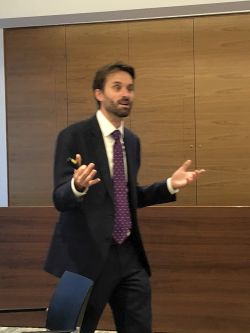Silent temporal resistance (or how to screw up other people's plans!)...
– the 2018 Urwick Lecture revisited...
Dr Simon Davey
As Autumn comes upon us, so does the annual Urwick lecture and a chance for practising management consultants to put wise academic fellows under the spotlight, and hopefully learn a trick or two.
Following a theme last visited in our 2018 Change Lecture - http://wcomc.org/2018May31-6 – Profs Gerry McGivern and Sue Dopson, winners of the

2018 Urwick Prize,
presented on “Time for a Change: How can consultants ensure that their recommendations are successfully implemented.”
What is time?
Time consciously and unconsciously regulates our lives. Time is integral to management and organisations, regulating activities and can influence and increase both speed and efficiency.
Time is money in organisations in two forms: we measure, allocate, spend and bill according to time but we also have deadlines and financial years (a slightly different form of time).
Yet dear reader, time does not exist. It is a mere construct. Our present – what YOU are doing now and reading – is merely conceptual. And what is time? Well, as St Augustine said: “How can the past and future be, when the past no longer is, and the future is not yet? As for the present, if it were always present and never moved on to become the past, it would not be time, but eternity.” [St Augustine of Hippo, Confessions]
And here is the crunch. Aside from our divergent conceptions of time – individual, social, occupational – we need to consider two key models. Chronos (clock time or chronological, sequential time as it happens) and Kairos (event time – literally a right, critical and opportune moment).
Time varies across culture. Japanese railways are always on time, Greek flight check ins are more laissez faire (sometimes to our advantage). African and Polynesian ‘appointments’ may be within a few hours of the time you thought you had agreed – client meetings almost always not so. Time can be fixed or time can be flexible.
And what of temporality – past, present and future? The what and when. Our simultaneous pursuit of different short and long term future objectives e.g. a single project within our (hopefully longer term) career trajectory.

But before you feel we are getting lost in Aristotelian philosophy, bear with us. The money shot is heading your way.
Entrainment is key – the synchronisation of concepts of time across organisations and its application involving actors and stakeholders with different conceptions of time. What is our common conception of time and how can we reach agreement in the best interests of both outcome and stakeholders or is this just another recipe for confusion, obfuscation and not achieving very much because of a fairly simple misunderstanding?
The nature of problems
Not all problems are conceptually the same. Problems may be critical (needing quick, simple top-down solutions) or they may be wicked (require dialogue about complexity between multiple stakeholders over a longer time period) - https://en.wikipedia.org/wiki/Wicked_problem. The timeframe needs to match to the respective solution but timeframes may, intentionally or otherwise, be constructed to adversely impact success. Which brings us to the nub of the issue –
Long ago, in a world not so far away, NHS QIPP (quality, innovation, productivity and prevention) set a 20% efficiency improvement target. What could go wrong?
In came a leading management consultancy. In conjunction with client senior management, a ‘critical financial problem’ was diagnosed. It (clearly) required ‘rapid redesign’. Lower down the ranks, client middle management saw a ‘wider complex project requiring time’, a more wicked one. The consultants ‘prescribed’ change. The middle managers questioned. Disengagement appeared like a spectre as all involved quickly ‘accepted’ the prescription for change, knowing there would be opportunities to oppose it later.
So middle management, not wanting a fight at this stage, signed off and proceeded to engage in silent temporal resistance. The force was with them. It was clear that the project wouldn’t deliver without their support and engagement and in three months would simply go away. It would be easy to blame the consultants for ignoring the ‘difficulty of implementation’. Yet the senior management were happy – everyone has agreed, it was going to work. And the management consultants? Well, their wise words had been apparently accepted by all and they were going to get paid as well as get more work.
Which brings us to the crux –

is the short term settlement suiting short term interests yet undermining the development of longer term solutions to complex problems? You think they’re on board but are they really? Have you just left the elephant sitting in the corner of the room? And is it waiting to do a ‘Blue Peter’ on you?
Implications for management consultants
Management Consultancy has been claimed to be the world’s newest profession and is still seeking to establish its technical and moral authority. Yet as Dominic Barton put it, management consultants often suffer from myopic timeframes and dubious short term placebos through the tyranny of short termism [https://hbr.org/2017/08/worries-about-short-termism-are-40-years-old-but-are-they-overblown and https://hbr.org/2011/03/capitalism-for-the-long-term]. Where will the authority come from and when will it emerge?
How can consultancy address wicked societal and organisational problems (such as sustainable health care or economic development) whilst constrained by short term financial objectives alongside Schein’s ‘philosophy of helping’ [https://sloanreview.mit.edu/article/a-general-philosophy-of-helping-process-consultation/] and process consulting?
Further thoughts
The roles of senior and middle management in organisations are akin to the hen and pig’s participation in breakfast. One is involved, the other is committed. Does this make management consultants a wolf in “hen’s clothing”?
Top down imposition rarely beats broader buy-in in the successful implementation of a change. Having the right leadership is key. The frameworks and successful drivers of change are well known but not often enough used.
Was the consultancy firm in question professional in taking on an assignment with an unrealistic remit or simply chasing an extra ‘Aston Martin in the drive’? The ethical conundrum is do we challenge the brief and risk losing the work? If we’re not ethical, are we even a profession? I don’t believe we would deserve to be.
Could there be a cleaner separation of plan versus implementation in these assignments? Who is responsible for which? Is a firm being commissioned to provide a whole solution when a leaner, more agile approach would be more practical for all concerned? This does create another challenge of ensuring the client appreciates your challenges enough to engage you on the next part of their journey (but does it matter if they don’t – aren’t there enough projects to go around?).
Did the solution matter enough? In organisations, if the regulator expects it, it gets done on time – compliance penalties rather focus the mind. If it’s an internal commission, it drags on. Did this project need more ‘piggies on the breakfast table’ rather than the light vegetarian option which was carefully put to one side for later? What are the consequences – clearly little or none for those involved – and how do we manage the perverse incentives and consequences of all involved?
In QIPP, middle managers weren’t listened to. The ‘solution’ was imposed. The project timeline was too rushed. It is easy, and common, to use problem complexity as a defence mechanism. Defence of the status quo, allied to an element of resistance. The heart of silent temporal politics.
Timeframes are subjective – the heart of the McGivern paper and the crux of Chronos vs Kairos – client versus consultant, the appeal of the new or important against the pull of business as usual and a lack of appropriate focus. Each party has different perceptions of time – of speed, of intensity.
In Government, there is a clash of short termism, of egos against ethics. “What does the minister want and when” because it has to be delivered in time to make them look good (or at least less bad). Nothing about an unacknowledged stepping stone as a legacy for the future. That doesn’t address the ego.
Time is indeed a precious commodity – we talk of time management, efficiency of time, yet not everyone works at the same level or pace. There are individual differences in efficiency. We need to learn to accept these differences and account for them rather than charging on regardless like the bull elephant in a hurry damaging the delicacy of the china shop.
Which leaves us with a closing thought and Markham’s Rules. The client is always wrong and the client is often right. There is no such thing as a consulting project, it’s always a client project and we’re there to help (not just pocket the money for an extra Aston Martin). Which poses a final question…
Isn’t it time we all started acting with ‘enlightened unreasonableness’ – “being the parent” – and putting our foot down when the client wants to do something rather silly, no matter whether we lose the commission and the money that involves? Is money really our principal driver (and shame on the profession if it is)? Enlightened unreasonableness may be the key to the profession’s future and it might save you looking stupid when your ‘stakeholders in hiding’ engage in silent temporal resistance. Just a thought.
References: You can read the full McGivern paper at: https://app.box.com/s/yjdwhb392ysca0mwv4qabamoqhybsds5

Dr Simon Davey, Freeman
www.drsimondavey.com – simon@omega-alpha.com
@drsimondavey

